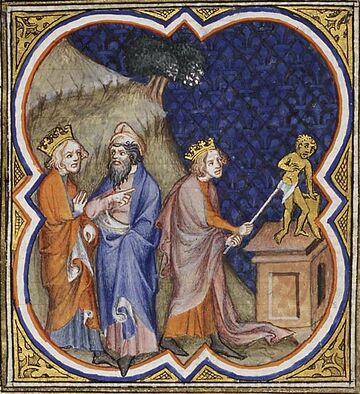عزاريا

Illustration in the Bible Historiale of King Asa of Judah destroying the idols, at Azariah's instigation.
عزاريا ( Azariah ؛ بالعبرية: עֲזַרְיָה ‘Ǎzaryā, "Yah has helped") كان نبياً موصوفاً في 2 Chronicles 15.
الرواية التوراتية
The Spirit of God is described as coming upon him (verse 1), and he goes to meet King Asa of Judah to exhort him to carry out a work of reform. In response to Azariah's encouragement, Asa carried out a number of reforms including the destruction of idols and repairs to the altar of Yahweh in the Jerusalem Temple complex. The Bible records that a period of peace followed the carrying out of these reforms (verse 19).
Azariah is described as being the "son of Oded" (verse 1), but the Masoretic Text omits Azariah's name in verse 8, suggesting that the prophecy is from Oded himself.
المراجع
This article may include material from Wikimedia licensed under CC BY-SA 4.0. Please comply with the license terms.